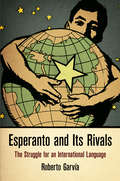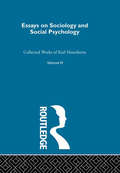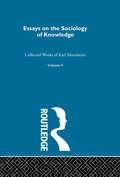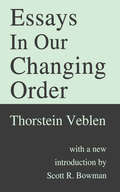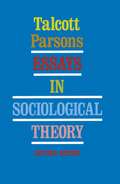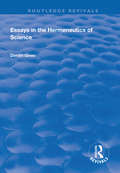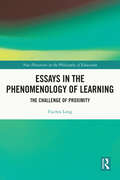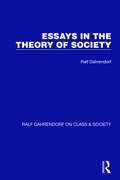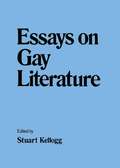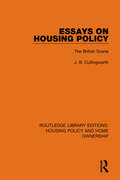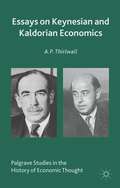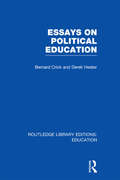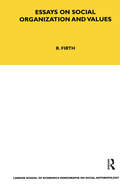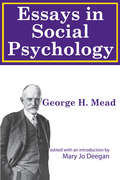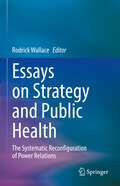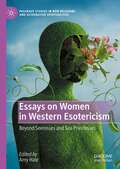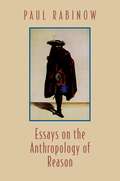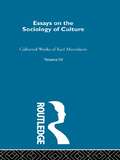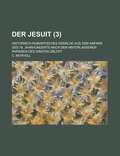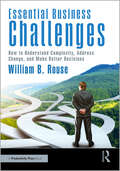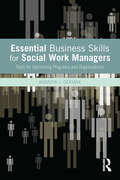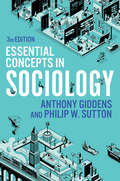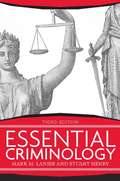- Table View
- List View
Esperanto and Its Rivals
by Roberto GarvíaThe problems of international communication and linguistic rights are recurring debates in the present-day age of globalization. But the debate truly began over a hundred years ago, when the increasingly interconnected world of the nineteenth century fostered a desire for the development of a global lingua franca. Many individuals and social movements competed to create an artificial language unencumbered by the political rivalries that accompanied English, German, and French. Organizations including the American Philosophical Society, the International Association of Academies, the International Peace Bureau, the Comintern, and the League of Nations intervened in the debate about the possibility of an artificial language, but of the numerous tongues created before World War II, only Esperanto survives today.Esperanto and Its Rivals sheds light on the factors that led almost all artificial languages to fail and helped English to prevail as the global tongue of the twenty-first century. Exploring the social and political contexts of the three most prominent artificial languages--Volapük, Esperanto, and Ido--Roberto Garvía examines the roles played by social movement leaders and inventors, the strategies different organizations used to lobby for each language, and other early decisions that shaped how those languages spread and evolved. Through the rise and fall of these artificial languages, Esperanto and Its Rivals reveals the intellectual dilemmas and political anxieties that troubled the globalizing world at the turn of the twentieth century.
Esperanza Speaks: Confronting a Century of Global Change in Rural Panama (Teaching Culture: UTP Ethnographies for the Classroom)
by Gloria RudolfEsperanza Speaks examines a century-long process of socioeconomic change in rural Panama through the experiences of one woman, Esperanza Ruiz, and four generations of her family. The intimate narrative shows how ordinary people, through their choices and actions, are affected by and, in turn, can affect how history unfolds. Readers see Esperanza’s family as both victims and protagonists in their own histories. Born into rural poverty with limited options, they still find small openings to try to improve their lives. Sometimes successful, sometimes not, they survive by drawing on their only abundant resource: each other. Based on twenty field visits over the course of fifty years, Esperanza Speaks is the result of a dedicated anthropologist’s long-term engagement with the individuals of a single community, and a beautiful example of ethnographic storytelling.
Essays Soc & Social Psych V 6
by Karl MannheimFirst published in 1969. Routledge is an imprint of Taylor & Francis, an informa company.
Essays Sociology Knowledge V 5: Collected Works Of Karl Mannheim
by Karl MannheimFirst published in 1952. Routledge is an imprint of Taylor & Francis, an informa company.
Essays in Our Changing Order: A Posthumous Collection Of Papers From Periodicals (Reprints Of Economic Classics Ser.)
by Thorstein VeblenEssays in Our Changing Order is the ninth volume in the collected works of America's pre-eminent social scientist. Each volume has a new opening essay, in this case, a comprehensive review of Veblen's works by Scott Bowman that stands by itself as a premier statement. Using an innovative framework, Bowman sees Veblen as concerned with three unifying themes: the dynamic interrelationships between instinct, habits of thought, environment, and social change in human evolution; the essential contradiction between business and industry sustained by the instinctual dominance of pecuniary exploit over workmanlike efficiency; and the role of ideological and animistic thinking in human affairs.This volume of Veblen's most important studies, published posthumously in 1936, illustrates and embellishes the themes Bowman outlines in a variety of ways, and is remarkable for its contemporanity and literary freshness. Veblen's editor, Leon Ardzrooni, divides the work into three major segments: essays on economics, including the history of the field; miscellaneous papers, which nearly all come to rest on matters of religion and philosophy; and what Ardzrooni calls war essays, which again reveal a very worldly and wise observer of current events and critic of national policies. What is so astonishing is the timeliness of these seemingly time bound concerns: whether dealing with the condition of women, the intellectual contributions of Jews, farm labor and unions, or the meaning of the Bolshevik Revolution, Veblen confronts us with insights into still-unfinished business.
Essays in Sociological Theory
by Talcott ParsonsTalcott Parsons needs little introduction to anyone acquainted with the literature of sociology. Few men have dominated their fields so much as Dr. Parsons does his. In this collection of nineteen essays, Dr. Parsons focuses his attention on subjects ranging from the social structure of Japan to propaganda and social control, from sociological aspects of Fascist movements to the place of psychoanalysis in society. Also dealt with are such topics as: The role of ideas in social action, the motivation of economic activities, American social structure, social classes and class conflict, and the prospects for contemporary sociological theory. The whole body of essays presented here belongs in the broad field of "application" of sociological theory. It stands in the line of scientific development of the most advanced techniques for sociological investigation and evaluation of data.
Essays in the Hermeneutics of Science (Routledge Revivals)
by Dimitri GinevPublished in 1997, this volume is written from a hermenutico-phenomenological point of view. The essays cover a spectrum of relevant issues: the essential interpretation of science; the possibility of a "strong hermeneutics of science" that takes into consideration science's cognitive structure; the implications of existential-ontological interpretations of science for the post-metaphysical dialogue between hermeneutics and epistomology; the place of rhetorical tools in the human sciences; and the strategies of overcoming the legitimation crisis of the human sciences. Because of its commitment to the radical universalization of the hermeneutic problem, the strong programme of hermeneutics of science, suggested in this book, avoids both objectivism and relativism. In this regard, the essays must be read in relation to the search for a middle way between defending epistemic rationality as a basis for futher development of the "project of modernity" and the postmodern deconstruction of all cognitive identities of modernity.
Essays in the Phenomenology of Learning: The Challenge of Proximity (New Directions in the Philosophy of Education)
by Fiachra LongThis book explores the phenomenology of learning with particular focus on the ‘closeness’ or ‘proximity’ of the knowledge that impacts on learners, young and old. Studying the power of learning to transform human beings, this book offers an in-depth discussion of how different phenomenologists understand this ‘proximate’ power. It draws on ideas of encounter from Husserl, care from Heidegger, bodily learning from Merleau-Ponty, language from Foucault, omnipotence from Winnicott and recognition from Honneth. The book examines how phenomenological insight can explain the character of radical learning. The book will appeal to academics and post-graduate students in the fields of philosophy of education, educational psychology, teaching, and learning.
Essays in the Theory of Society (Ralf Dahrendorf on Class & Society #2)
by Ralf DahrendorfOriginally published in 1968, these ten essays by one of Europe’s leading sociological theorists deal with important issues on the borderline between sociology and social philosophy and demonstrate the author’s deep insight into history and political analysis. The author maintains that the structures of power in which the political process takes place not only originate change and give it direction, but also produce the fertile conflicts that give expression to the fundamental uncertainty of human existence. Through an examination of various concepts inherent in this dynamic process – power, resistance, conflict, change, freedom, uncertainty – a coherent theory of society emerges.
Essays on Economics and Economists
by R. H. CoaseHow do economists decide what questions to address and how to choose their theories? How do they tackle the problems of the economic system and give advice on public policy? With these broad questions, Nobel laureate R. H. Coase, widely recognized for his seminal work on transaction costs, reflects on some of the most fundamental concerns of economists over the past two centuries. In fifteen essays, Coase evaluates the contributions of a number of outstanding figures, including Adam Smith, Alfred Marshall, Arnold Plant, Duncan Black, and George Stigler, as well as economists at the London School of Economics in the 1930s. Ronald H. Coase was awarded the Nobel Prize in Economic Science in 1991.
Essays on Gay Literature
by Stuart KelloggAn important contribution to the rapidly growing field of gay literary criticism and scholarship, this volume contains well-written and intelligently argued essays on the the homosexual tradition in Western literature. The first book of its kind, Essays on Gay Literature investigates the ways in which homosexuality has been viewed by a variety of authors from the Middle Ages to the present, including William Shakespeare, Christopher Marlowe, E. M. Forster, James Merrill, Henry James, and William Faulkner.
Essays on Housing Policy: The British Scene
by J. B. CullingworthOriginally published in 1979, these essays provide a guide to the labyrinth of issues which together made up ‘housing policy’ in the late 20th Century. The focus is on the practical and political difficulties of devising measures which meet policy objectives – difficulties which are just as prevalent in the 21st Century. The search for ‘comprehensive strategies’ is shown to be a vain one: given the number of relevant issues and their complexity, only an incremental approach is practicable. Major issues are discussed in the context of an analysis of the institutional, historical and financial framework within which housing policy is formulated and operated.
Essays on Keynesian and Kaldorian Economics
by A. P. ThirlwallThis volume of essays contains 16 papers the author has written over the last 40 years on various aspects of the life and work of John Maynard Keynes and Nicholas Kaldor. It covers both theoretical and applied topics and highlight the continued relevance of Keynesian and Kaldorian ideas for understanding the functioning of capitalist economies.
Essays on Political Education (Routledge Library Editions: Education)
by Bernard Crick Derek HeaterIn the 1960s and 1970s there was a remarkable development of interest in political education not only in Britain but also in other countries, namely the USA, Germany and Australia. This volume provides scholars and teachers in this field with a picture of British work in the area of political education.
Essays on Social Organisation and Values (London School Of Economics Monographs On Social Anthropology Ser. #No. 28)
by Raymond FirthIn this volume Professor Firth has brought together and commented upon a number of his papers on anthropological subjects published over the last thirty years. All these essays relate in different ways to his continuing interest in the study of social process, especially in the significance within a social context of individual choice and decision. Although some specialist studies are included, e.g. the group of papers dealing with the Polynesian island of Tikopia, the main themes of the book are broad ones and there are important general essays on such topics as social change; social structure and organization; modern society in relation to scientific and technological progress; and the study of values, mysticism, and religion by anthropologists. There is also a hitherto unpublished chapter on anthropology as a developing science.
Essays on Social Psychology
by George MeadGeorge Herbert Mead (1863-1931) is a central, founding figure of modern sociology, comparable to Karl Marx and Max Weber. Mead's early work, prior to his posthumous publications that appeared after 1932, is believed to be a series of articles contemporary scholarship defines as disconnected. A previously unknown, never published set of galleys for a book of essays by Mead, written between 1892 and 1910, unites these articles into a logical perspective. Essays on Social Psychology, Mead's "first" book, clearly locates him within a significantly different tradition and network than documented in his posthumous volumes. The discovery of this work is a major scholarly event. Instead of being abstract and unemotional, as some scholars argue, Mead's early scholarship focused on the significance of emotions, instincts, and childhood as well as political issues underlying political problems in Chicago. During these early years, he was involved with the emerging Laboratory Schools at the University of Chicago which was then the center of progressive education. These early topics, interpretations, and scholarly networks are dramatically different in these writings from those of Mead as a mature scholar. They demonstrate that he was clearly making a transition from psychology to social psychology at a time when the latter was in its infancy. Mary Jo Deegan, a world-renowned Meadian scholar, has comprehensively edited this volume, footnoting now obscure references and authors. Her introduction explains how this previously lost manuscript affects contemporary Meadian scholarship and how it reflects the city and times in which he lived. Unlike the posthumous volumes, assembled from lecture notes, Essays in Social Psychology is the only book actually written by Mead and challenges most current scholarship on him. The selections are highly readable, surprisingly timely yet historically significant. Psychologists, sociologists, and educators will find it immensely important. George Herbert Mead (1863-1931) taught at the University of Chicago from 1894 to 1931. His posthumous volumes are The Philosophy of the Present, Mind, Self, and Society, and The Philosophy of the Act. Mary Jo Deegan is professor of sociology at the University of Nebraska, Lincoln. She is the author of Jane Addams and the Men of the Chicago School, 1892-1918, named by Choice as among the outstanding academic books of 1989.
Essays on Strategy and Public Health: The Systematic Reconfiguration of Power Relations
by Rodrick WallaceThis book is a collection of essays that explore commonalities and contrasts between strategy in armed conflict and strategy in public health. The first part uses the asymptotic limit theorems of information and control theories to study strategy as an exchange of messages between adversaries, in the context of underlying power relations. The ‘messages’ to be exchanged are constructed from an ‘alphabet’ of tactics available to each contender, in a large sense. The second part of the book explores four case histories from this perspective, ranging across agribusiness-generated pandemics, through tuberculosis and COVID-19. The final chapter attempts a strategic synthesis applicable more specifically to public health than to the remarkably – and disturbingly -- close parallel of armed conflict. Taking a unique approach to public health tactics and strategy this volume will be of interest to social epidemiologists, public health economists, public policy scientists, as well as public health researchers and practitioners.
Essays on Women in Western Esotericism: Beyond Seeresses and Sea Priestesses (Palgrave Studies in New Religions and Alternative Spiritualities)
by Amy HaleThis book is the first collection to feature histories of women in Western Esotericism while also highlighting women’s scholarship. In addition to providing a critical examination of important and under researched figures in the history of Western Esotericism, these fifteen essays also contribute to current debates in the study of esotericism about the very nature of the field itself. The chapters are divided into four thematic sections that address current topics in the study of esotericism: race and othering, femininity, power and leadership and embodiment. This collection not only adds important voices to the story of Western Esotericism, it hopes to change the way the story is told.
Essays on the Anthropology of Reason
by Paul RabinowThis collection of essays explains and encourages new reflection on Paul Rabinow's pioneering project to anthropologize the West. His goal is to exoticize the Western constitution of reality, emphasize those domains most taken for granted as universal, and show how their claims to truth are linked to particular social practices, hence becoming effective social forces. He has recently begun to focus on the core of Western rationality, in particular the practices of molecular biology as they apply to our understanding of human nature. This book moves in new directions by posing questions about how scientific practice can be understood in terms of ethics as well as in terms of power. The topics include how French socialist urban planning in the 1930s engineered the transition from city planning to life planning; how the discursive and nondiscursive practices of the Human Genome Project and biotechnology have refigured life, labor, and language; and how a debate over patenting cell lines and over the dignity of life required secular courts to invoke medieval notions of the sacred. Building on an ethnographic study of the invention of the polymerase chain reaction--which enables the rapid production of specific sequences of DNA in millions of copies Rabinow, in the final essay, reflects in dialogue with biochemist Tom White on the place of science in modernity, on science as a vocation, and on the differences between the human and natural sciences.
Essays on the Sociology of Culture (Routledge Classics in Sociology)
by Karl MannheimKarl Mannheim was one of the leading sociologists of the twentieth century. Essays on the Sociology of Culture, originally published in 1956, was one of his most important books. In it he sets out his ideas of intellectuals as producers of culture and explores the possibilities of a democratization of culture. This new edition includes a superb new preface by Bryan Turner which sets Mannheim's study in the appropriate historical and intellectual context and explains why his thought on culture remains essential for students engaged in debates about mass culture, the politics of culture and postmodernity.
Essays on the Sociology of Knowledge
by Karl MannheimThe book contains six essays which Mannheim wrote and published in German scientific magazines between 1923 and 1929 that elaborate one dominant theme, the Sociology of Knowledge, representing one of Mannheim's main contributions to sociological theory. [Note: All errors in the Bookshare file are exactly as printed in the book.]
Essential Business Challenges: How to Understand Complexity, Address Change, and Make Better Decisions
by William B. RouseSociety seems increasingly complex, in part due to constant “breaking news,” likes, tweets, etc. Considerable change is being entertained, or at least debated. Significant decisions are required. Decision-making lately has been flawed, laced with contention, hesitancy, and poor outcomes.The author has long helped clients and sponsors to understand complexity, address needs for change, formulate plans, and make decisions to invest resources to execute these plans. His engagement with them has focused on formulating problems, devising possible solutions, and deciding which solutions merited investment.This book represents the author's reflections on these engagements, associated challenges, and typical outcomes. These stories are reports about clients' or sponsors’ problems and how he and his colleagues went about addressing these problems of complexity, change, and decision-making. The clients or customers for these services included over 100 enterprises in industry, government, and academia. Most were large, many in the US, but quite a few were in Europe, Asia, Africa, and Latin America. Geography mattered in these engagements but did not dominate.The chapters in this book represent his reports on what he learned, and what he could generalize across airplanes, automobiles, banking, computers, communications, insurance, pharmaceuticals, retail, satellites, semiconductors, and telecoms, working with stakeholders from companies, agencies, and academia.
Essential Business Skills for Social Work Managers: Tools for Optimizing Programs and Organizations
by Andrew J. GermakMany social workers find themselves in management positions within a few years of graduating from MSW programs. Most of these jobs are in nonprofit human service organizations in which, increasingly, business acumen is necessary to maintain grants and donations, start new programs, market services to clients, supervise the finance function, and understand the external environment. This book teaches MSW students and early-stage social work management practitioners the essential business skills needed to manage programs and organizations; to improve their overall management toolkit for finding a better job or getting promoted; and, ultimately, to gain parity with other managers holding MBA degrees and working in the human service space. This text can serve as a desk reference for managers to troubleshoot various situations. It is also appropriate for social work macro practice courses at the undergraduate and graduate levels, as well as courses that cover human resource management and financial management.?
Essential Concepts in Sociology
by Anthony Giddens Philip W. SuttonSocial life is in a constant process of change, and sociology can never stand still. As a result, contemporary sociology is a theoretically diverse enterprise, covering a huge range of subjects and drawing on a broad array of research methods. Central to this endeavour is the use of core concepts and ideas which allow sociologists to make sense of societies, though our understanding of these concepts necessarily evolves and changes. This clear and jargon-free book introduces a careful selection of essential concepts that have helped to shape sociology and continue to do so. Going beyond brief, dictionary-style definitions, Anthony Giddens and Philip W. Sutton provide an extended discussion of each concept which sets it in historical and theoretical context, explores its main meanings in use, introduces relevant criticisms, and points readers to its ongoing development in contemporary research and theorizing. Organized in ten thematic sections, the book offers a portrait of sociology through its essential concepts, ranging from capitalism, identity and deviance to the digital revolution, environment, postcolonialism and intersectionality. It will be essential reading for all those new to sociology as well as anyone seeking a reliable route map for a rapidly changing world.
Essential Criminology
by Mark M. Lanier Stuart HenryIn the third edition of Essential Criminology, authors Mark M. Lanier and Stuart Henry build upon their critical review of criminology, expanding their coverage of the multifaceted “Crime Prism,” adding boxed readings by both international theorists and students, and identifying the six fundamental world changes that are altering the way we think about crime. By reframing crime and its control in the context of global interdependence, the communications revolution, and changing perceptions of national security, the authors ask: what kind of criminology is needed for the twenty-first century? With cutting-edge updates and illustrative real-world examples of everything from Blackwater to government surveillance and Lombroso’s legacy to the global spread of disease, this text is a necessity for both undergraduate and graduate courses in criminology.
